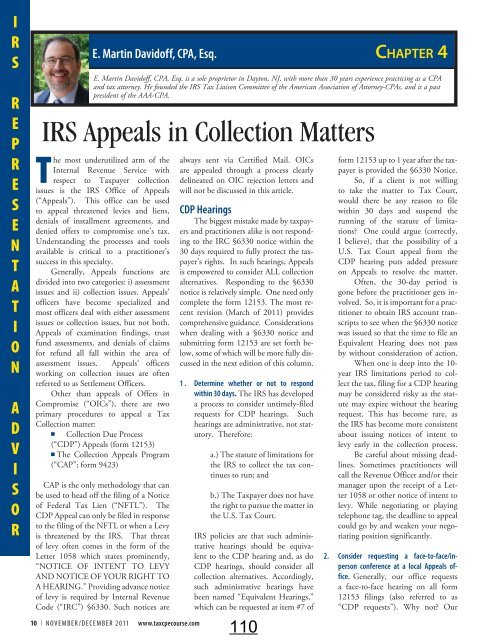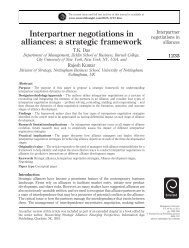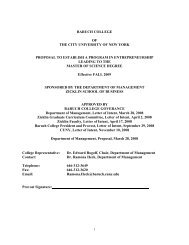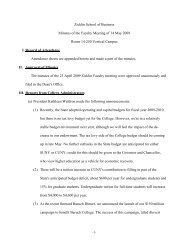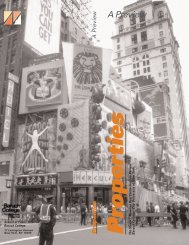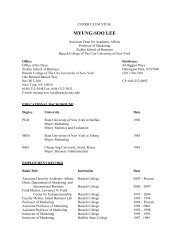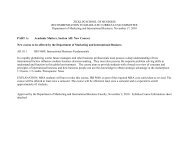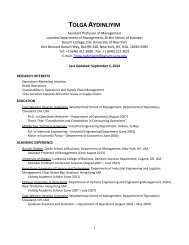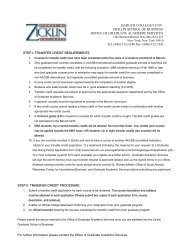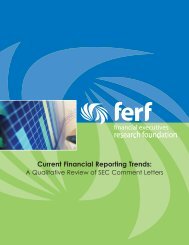Tax Seminar #3 – December 3 2012
Workbook - Zicklin School of Business
Workbook - Zicklin School of Business
You also want an ePaper? Increase the reach of your titles
YUMPU automatically turns print PDFs into web optimized ePapers that Google loves.
I<br />
R<br />
S<br />
R<br />
E<br />
P<br />
R<br />
E<br />
S<br />
E<br />
N<br />
T<br />
A<br />
T<br />
I<br />
o<br />
N<br />
A<br />
d<br />
v<br />
I<br />
S<br />
o<br />
R<br />
`<br />
E. Martin Davidoff, CPA, Esq. Chapter 4<br />
E. Martin Davidoff, CPA, Esq. is a sole proprietor in Dayton, NJ, with more than 30 years experience practicing as a CPA<br />
and tax attorney. He founded the IRS <strong>Tax</strong> Liaison Committee of the American Association of Attorney-CPAs, and is a past<br />
president of the AAA-CPA.<br />
IRS Appeals in Collection Matters<br />
The most underutilized arm of the<br />
Internal Revenue Service with<br />
respect to <strong>Tax</strong>payer collection<br />
issues is the IRS Office of Appeals<br />
(“Appeals”). This office can be used<br />
to appeal threatened levies and liens,<br />
denials of installment agreements, and<br />
denied offers to compromise one’s tax.<br />
Understanding the processes and tools<br />
available is critical to a practitioner’s<br />
success in this specialty.<br />
Generally, Appeals functions are<br />
divided into two categories: i) assessment<br />
issues and ii) collection issues. Appeals’<br />
officers have become specialized and<br />
most officers deal with either assessment<br />
issues or collection issues, but not both.<br />
Appeals of examination findings, trust<br />
fund assessments, and denials of claims<br />
for refund all fall within the area of<br />
assessment issues. Appeals’ officers<br />
working on collection issues are often<br />
referred to as Settlement Officers.<br />
Other than appeals of Offers in<br />
Compromise (“OICs”), there are two<br />
primary procedures to appeal a <strong>Tax</strong><br />
Collection matter:<br />
■■<br />
Collection Due Process<br />
(“CDP”) Appeals (form 12153)<br />
■■The Collection Appeals Program<br />
(“CAP”; form 9423)<br />
CAP is the only methodology that can<br />
be used to head off the filing of a Notice<br />
of Federal <strong>Tax</strong> Lien (“NFTL”). The<br />
CDP Appeal can only be filed in response<br />
to the filing of the NFTL or when a Levy<br />
is threatened by the IRS. That threat<br />
of levy often comes in the form of the<br />
Letter 1058 which states prominently,<br />
“NOTICE OF INTENT TO LEVY<br />
AND NOTICE OF YOUR RIGHT TO<br />
A HEARING.” Providing advance notice<br />
of levy is required by Internal Revenue<br />
Code (“IRC”) §6330. Such notices are<br />
10 I NOVEMBER/DECEMBER 2011 www.taxcpecourse.com<br />
always sent via Certified Mail. OICs<br />
are appealed through a process clearly<br />
delineated on OIC rejection letters and<br />
will not be discussed in this article.<br />
CDP Hearings<br />
The biggest mistake made by taxpayers<br />
and practitioners alike is not responding<br />
to the IRC §6330 notice within the<br />
30 days required to fully protect the taxpayer’s<br />
rights. In such hearings, Appeals<br />
is empowered to consider ALL collection<br />
alternatives. Responding to the §6330<br />
notice is relatively simple. One need only<br />
complete the form 12153. The most recent<br />
revision (March of 2011) provides<br />
comprehensive guidance. Considerations<br />
when dealing with a §6330 notice and<br />
submitting form 12153 are set forth below,<br />
some of which will be more fully discussed<br />
in the next edition of this column.<br />
1 . Determine whether or not to respond<br />
within 30 days. The IRS has developed<br />
a process to consider untimely-filed<br />
requests for CDP hearings. Such<br />
hearings are administrative, not statutory.<br />
Therefore:<br />
a.) The statute of limitations for<br />
the IRS to collect the tax continues<br />
to run; and<br />
b.) The <strong>Tax</strong>payer does not have<br />
the right to pursue the matter in<br />
the U.S. <strong>Tax</strong> Court.<br />
IRS policies are that such administrative<br />
hearings should be equivalent<br />
to the CDP hearing and, as do<br />
CDP hearings, should consider all<br />
collection alternatives. Accordingly,<br />
such administrative hearings have<br />
been named “Equivalent Hearings,”<br />
which can be requested at item #7 of<br />
110<br />
form 12153 up to 1 year after the taxpayer<br />
is provided the §6330 Notice.<br />
So, if a client is not willing<br />
to take the matter to <strong>Tax</strong> Court,<br />
would there be any reason to file<br />
within 30 days and suspend the<br />
running of the statute of limitations?<br />
One could argue (correctly,<br />
I believe), that the possibility of a<br />
U.S. <strong>Tax</strong> Court appeal from the<br />
CDP hearing puts added pressure<br />
on Appeals to resolve the matter.<br />
Often, the 30-day period is<br />
gone before the practitioner gets involved.<br />
So, it is important for a practitioner<br />
to obtain IRS account transcripts<br />
to see when the §6330 notice<br />
was issued so that the time to file an<br />
Equivalent Hearing does not pass<br />
by without consideration of action.<br />
When one is deep into the 10-<br />
year IRS limitations period to collect<br />
the tax, filing for a CDP hearing<br />
may be considered risky as the statute<br />
may expire without the hearing<br />
request. This has become rare, as<br />
the IRS has become more consistent<br />
about issuing notices of intent to<br />
levy early in the collection process.<br />
Be careful about missing deadlines.<br />
Sometimes practitioners will<br />
call the Revenue Officer and/or their<br />
manager upon the receipt of a Letter<br />
1058 or other notice of intent to<br />
levy. While negotiating or playing<br />
telephone tag, the deadline to appeal<br />
could go by and weaken your negotiating<br />
position significantly.<br />
2. Consider requesting a face-to-face/inperson<br />
conference at a local Appeals office.<br />
Generally, our office requests<br />
a face-to-face hearing on all form<br />
12153 filings (also referred to as<br />
“CDP requests”). Why not? Our


